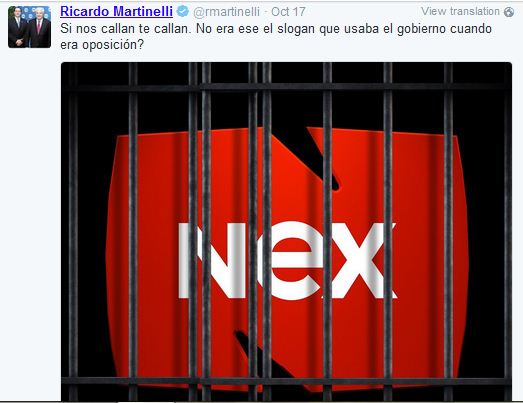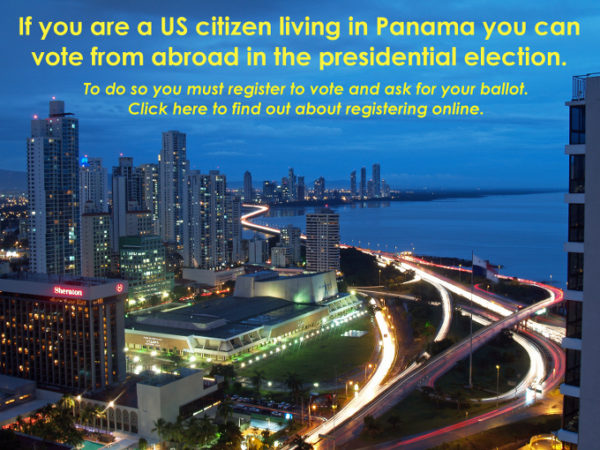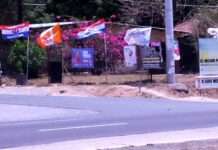
Ricky and his boys play dodgeball, but some get hit
by Eric Jackson
Apparently safe for the time being in his Miami refuge, Ricardo Martinelli goes on Twitter to celebrate legal victories that may be ephemeral and denounce setbacks that also may prove temporary.
The basic power balance is this:
- Martinelli and his inner circle ran a notorious looting binge and most Panamanians want to see him brought back to Panama and jailed;
- There are political complications for the United States to kick the former Panamanian president out; and
- In Panama the courts are conflicted by the strong residue of Martinelli’s influence and a countervailing widespread public annoyance with this.
Add to that mix the implementation of the accusatory system of criminal procedure in the nation’s most populous eastern area — Panama, Colon and Darien provinces — that leads to decisions of sorts that are unfamiliar to most Panamanians. Then there is the bifurcation in criminal justice, wherein some current or former public officials may only be tried by the Supreme Court or the National Assembly, while others are processed in the ordinary court system.
The sum is that while Martinelli remains in exile in Miami and is apparently protected from an extradition request by political factors that may evaporate with the US elections next month or inauguration of a new US administration early next year, some of the men and women who worked for him are facing trials here. Some of these are out on bail, some are being held in preventive detention and the ones “exonerated” by a controversial appeals court decision may end up back on the hook and the judges that issued that ruling may face criminal charges for it.
The new criminal procedure rules make bail the supposed norm, so we see former officials implicated in alleged multi-million-dollar peculations getting out pending trial and many Panamanians taking this as an example of impunity for the rich and powerful. On the other hand, we see some of Martinelli’s close associates being jailed without bail and civil libertarians who would like to see them ultimately sent to prison criticizing the denial of bail while the charges are pending.
Francolini jailed, not for running Martinelli’s TV channel
On October 12 anti-corruption prosecutor Tania Sterling ordered the preventive detention of Riccardo Francolini, now president and reputed minority shareholder of Ricardo Martinelli’s NexTV television channel. It was for a $7 million loan that the state-owned Caja de Ahorros granted in the name of the HPC-Contratas-P&V consortium, a construction group in which former vice president and relative of Ricardo Martinelli’s by marriage Felipe “Pipo” Virzi is said to be a major player. That consortium had a $193 million contract to build a convention center on Amador, a job which it started but was unable to complete. On the government side, the contract was granted by the Panama Tourism Authority, then headed by Martinelli’s right-hand man, Salomón Shamah, who since Martinelli’s departure from the presidency has returned to his native Colombia.
The prosecution claims that the $7 million wasn’t for the consortium or the convention center project, but to a Virzi company named Summer Venture Inc, which in turn was a conduit to funnel the money to several other businesses linked to Martinelli, Virzi and now imprisoned former Supreme Court magistrate Alejandro Moncada Luna. Under the Caja de Ahorros rules the ultimate beneficiaries of the loan would not have been eligible for such state support.
The defense points out that the loan was repaid, and asserts that because there was no ultimate loss to the bank, there was no crime. Although this sort of claim has been asserted and sometimes accepted by courts or prosecutors in past public corruption cases, there is a strong consensus among lawyers that the repayment of money improperly obtained from the government is not a defense to the crime but only a mitigating factor at sentencing time.
Ordered held without bail along with Francolini were the former number two man at the bank, Rodrigo Arosemena Pino and three other former management figures. Former board members have had knowledge of or participation in the scheme imputed to them and have been or are being questioned by prosecutors, but are not formally under criminal investigation and may or may not eventually be in that situation. But when one looks beyond the bank at the conduits and beneficiaries in the allegedly illegal transaction, it gets to most of Martinelli’s inner circle and Martinelli himself. There may be statute of limitations problems with pursuit of these people, several of whom are also the beneficiaries of a controversial appeals court ruling holding that their alleged financial crimes in association with Alejandro Moncada Luna were legalized by a plea bargain that spared the former magistrate prosecution for other than the charges that landed him in prison.
The preventive detention order has been widely criticized by lawyers and civil libertarians. Under the new criminal procedure rules, bail should ordinarily be granted unless there is a good reason like a flight risk, a large unrecovered stolen fortune to be concealed or moved or the probability that witnesses will be intimidated, bribed or assaulted. None of these factors appear to be the case with Francolini.
There may be unknown factors — at least unknown to the general public — at play here. The usual one is that Panamanian corporate secrecy laws intentionally make it hard to identify the beneficial owners of corporations. This structural incentive for public corruption is not one of the things that President Varela in his dealings with foreign governments after the Panama Papers revelations, or any significant faction of the National Assembly, are talking about changing. Also, in the raid on Francolini’s house in which he was arrested, police and prosecutors seized at least one computer and a cryptic Public Ministry statement suggested information about other matters of interest to authorities being found through that seizure.
Extraordinary procedures in the wake of a corrupt appellate ruling
Ordinarily when an appeals court lets a criminal defendant off of the hook that’s the end of the matter, no further prosecution appeals being allowed. But the Second Superior Court of Justice ruling that Alejandro Moncada Luna’s plea bargain to go to prison for amassing a fortune worth millions of dollars that can’t be explained as coming from a legitimate source while he was a high court magistrate and for forging documents means that none of Moncada Luna’s 14 alleged accomplices can be prosecuted for their parts in the disgraced ex-jurist’s crimes is a legal absurdity.
None of the people who were let off of the hook by that ruling — who by and large comprise much of Ricardo Martinelli’s inner circle of friends — were parties to the case against Moncada Luna. They could not have been, because that legal drama unfolded in the National Assembly, which does has jurisdiction over Supreme Court magistrates but not ordinary citizens. But the files generated by the Moncada Luna case do figure in the investigation that led to charges against Pipo Virzi, Panama Canal Authority board member Nicolás Corcione Pérez Balladares, Ricky Calvo and several others. Deeper digging indicated that Moncada Luna’s ill-gotten fortune derived largely from a series of overpriced contracts that involved kickbacks, with accomplices arranging the deals or laundering the proceeds and generally getting a piece of the action.
Were the notion that an agreement not to pursue all charges against one member of a criminal enterprise absolves all of that offender’s accomplices for unprosecuted crimes to be uniformly applied, a lot of currently incarcerated gang members would have to be freed. (As precedent means relatively little in the Civil Code family of legal systems of which Panama’s is a part, it would not come to that.) Whether or not it ever gets invoked again, the 2-1 appeals court ruling was bad law and finds virtually no defenders in the legal community.
The decision to remove Moncada Luna’s alleged accomplices — who include his wife — from legal jeopardy did not come any of the criminal defendants as such. It was a ruling on a motion brought by an anonymously held corporation whose assets were frozen as allegedly laundered criminal proceeds.
Because the case below was decided on an argument of law and because one of the three judges dissented, organized crime prosecutors have petitioned the Supreme Court to accept a recurso de casación, a relatively rare summary appeal that would declare the Second Tribunal’s ruling null and void, sending the case back to prosecutors for further proceedings. That petition has stayed the effects of the intermediate court’s ruling, which include the return of millions of dollars in frozen bank accounts and other property to the accused.
The case complicates the already problematic life of the Supreme Court, as the Second Tribunal’s ruling was written by Supreme Court magistrate Wilfredo Sáenz, a Martinelli appointee, who was sitting with the lower court. One high court colleague, Harry Díaz, has criticized the ruling in the press.
There are calls for accountability for a corrupt decision. As to Sáenz, jurisdiction for that would lie with the legislature. At the moment the deputies are busy with their annual late October scramble before the October 31 end of their regular session and are not taking up the matter. At least one complaint against Sáenz has been filed with them.
Sáenz got the vote and one-word concurrence of appellate judge María de Lourdes Estrada de Villar, who unlike a high court magistrate would be accountable before the ordinary criminal justice system if an investigation or charges are to occur. Private complaints have been filed against her with the Public Ministry. So far there is no indication whether that ministry’s prosecutors will pursue the matter.
If any proceedings arise against either Sáenz or Estrada an argument that liability for bad rulings would infringe upon judicial independence would likely be interposed. During Panama’s long military dictatorship the independent judge was the exception. It has been alleged the when Moncada Luna was the high court’s presiding magistrate Ricardo Martinelli would send the tourism minister, Salo Shamah, to the Supreme Court with orders for the courts. Despite President Juan Carlos Varela’s denials and little evidence to contradict them there are occasional allegations of and a widespread public belief of ongoing and systematic political interference by the presidency in the affairs of the courts.
Will Martinelli be extradited?
By September 28 a formal Panamanian request to extradite Ricardo Martinelli had arrived at the US State Department’s headquarters at Foggy Bottom in Washington DC. The Supreme Court detention order on which that was based was issued in late December of 2015, based on illegal electronic eavesdropping charges. More than a dozen other pending legal proceedings against Martinelli, mostly based on embezzlement, bribery or contracts with kickbacks, are pending at various stages of the legal process here and are not part of the extradition case.
Notwithstanding an INTERPOL “red letter” arrest warrant, it’s normal for US authorities to take some time to analyze an extradition request before acting on it. There are ordinary but important concerns about an accused person being subjected to a sham trial, torture, political or ethnic persecution or punishment that’s unreasonably severe for a given offense in the eyes of US culture. There are treaty concerns, not only with the 1904 US-Panamanian extradition agreement that does not broach the subject of illegal surveillance, but also with subsequent mutual legal assistance pacts, probably some of which are state secrets.
Beyond the ordinary, this is a request for for the extradition of a former head of state. There may be matters that the US government would not want to have discussed in a court proceeding open to the Panamanian public, things like US military and mercenary activities in Panama, ongoing DEA investigations, the names of spies or informants for the US government, certain details about the capture of a North Korean freighter bearing military materials buried under a cargo of sugar or so on. There are precedents for the United States to condition an extradition on guarantees that certain matters will not be raised in court, but beyond that there would be concerns about whether a guarantee about what will or will not be allowed to transpire in a court proceeding would or could be enforced under Panamanian law.
There are possible legal or political complications arising from Ricardo Martinelli’s immigration status in the United States, which is not a matter of open public record. It is presumed that Martinelli is living in Miami on an extended or overstayed tourist visa, but he lived in the USA for enough years to hold the green card of resident alien status or even to have acquired US citizenship. The State Department never comments on immigration status matters, citing privacy concerns. But what would be the political effect in South Florida of extraditing a right-wing politician with friends in Miami’s exile community who is a naturalized US citizen? At the very least it may make the Obama administration want to put off any extradition move until after the November election.
In any case US State Department Counselor Kristie A. Kenney visited her on October 6 and almost certainly discussed the extradition request with top Panamanian officials. We don’t know that for sure, however, because there were no official press releases about that subject and because during her visit Kenney brushed off questions by telling reporters that the United States does take the request seriously and it’s inappropriate for her to talk about it. It was a diplomatically correct answer.
For his part President Varela has said that he wants to see Martinelli brought back to Panama to stand trial. Polls indicate that most Panamanians want to see Martinelli extradited, most believe that Varela has more control over the courts than he probably does, and most are displeased by the slow pace of proceedings against Martinelli and his entourage. There may be discrepancies between what is said in public and what is discussed with diplomats.
~ ~ ~
These announcements are interactive. Click on them for more information.










